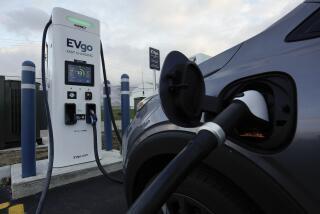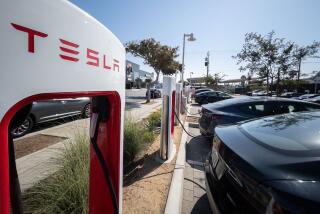He’s a driving force in the world of electric cars
The gig: He doesn’t make the cars of the future; he makes the cars of the future go. As chief executive of AC Propulsion Inc., Tom Gage advances the technologies under the hoods of electric transportation. The high-tech batteries and drive systems made by the San Dimas company power a growing number of electric vehicles. Those include a test fleet of BMW’s electric Minis, which are currently whooshing -- silently -- over roads in California, New York and New Jersey.
From the pits to this: A self-described “car nut” since childhood, Gage moved to Georgia to work as a race mechanic after graduating from Stanford University with an engineering degree. After a few years tinkering with turbos and emissions systems, he wiped off the grease, got an MBA and landed a job at Chrysler. There he got his first jolt of electric transportation, working on a program to develop plug-in passenger vehicles. That effort sputtered, and Gage ultimately left Detroit for California to consult on advanced vehicle technologies.
In 1994, he met Alan Cocconi, who had put an electric drivetrain into an old Honda Civic. Driving it, Gage said, “was a life-changing experience for me.” Soon after, he “started hanging out at AC Propulsion,” Cocconi’s company, and worked his way up the ladder.
Big break: For a while, AC Propulsion cobbled together its own vehicle line, dubbed the eBox, by converting Toyota’s Scion xB hatchbacks into electric cars with a 120-mile range for $55,000 (plus the cost of the Scion). The first customer was actor Tom Hanks, Gage said. AC Propulsion also helped Tesla Motors of San Carlos, Calif., develop its $109,000 electric Roadster. But the real breakthrough came last year when BMW picked Gage’s company to supply the drivetrain and battery for its Mini E electric program, an order for some 600 cars.
“When that came along, we totally dropped eBox,” Gage said. “We had our hands full.”
Not too fast, but furious: With a staff of just 35 employees in the U.S. and 50 in the Shanghai factory it opened in 2006, AC Propulsion isn’t a high-volume shop. Each month it manufactures just 40 drive systems, which sell for roughly $25,000 apiece. Still, Gage says the privately held company is making money, a rarity in the world of electric cars.
“We’re very profitable, and that distinguishes us from just about everybody in the business,” Gage said.
The future is current: Gasoline engines can be great for power or for fuel economy, but not both, Gage said. That’s a compromise that electric cars don’t have to make. He said vehicles running AC Propulsion’s drivetrain, called the tzero, can have bullet-like acceleration yet still get from point A to point B for just a few pennies’ worth of juice. The only limitation is range, which is rapidly increasing as lithium battery technology improves.
“The most compelling feature is that you don’t use petroleum,” Gage said. “For many uses, electrics are superior.”
Why Detroit will win: Start-ups like AC Propulsion are leading the development of electric vehicles. Still, Gage isn’t counting out old-line automakers. Blame the eight years spent at Chrysler.
“When you see the precision and scale of a huge auto factory, you realize just how hard and expensive it is to mass-produce cars,” Gage said. He believes that giants like Ford Motor Co. and Toyota Motor Corp. will ultimately buy up promising companies in the car space.
“Making parts for 10,000 or 100,000 cars is too much for us,” Gage said. “Our goal is to be a participant in the early part of the process and then plan a timely exit.”
The more things change: In some ways Gage, who is 59 and has two kids, has come full circle. One of his first jobs was running a business that removed the emission-control devices from sports cars so that they would go faster.
Three decades later, he’s running a company that removes emissions from cars altogether.
“It’s always been about modifying cars to make them things that people want to drive,” he said.
What‘s he driving? Gage generally scoots about in an eBox or a Mini E but admits to owning a Toyota and a pair of Volkswagens. And because his Sunnyvale home is 375 miles from work, he logs quite a few miles on airplanes, which he knows aren’t exactly carbon neutral.
“It just rubs me the wrong way to start up a gas engine,” Gage said.






